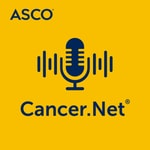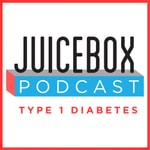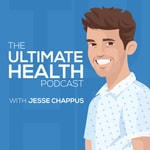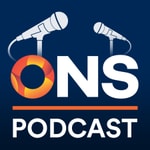NP Pulse: The Voice of the Nurse Practitioner (AANP) – Détails, épisodes et analyse
Détails du podcast
Informations techniques et générales issues du flux RSS du podcast.
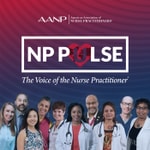
NP Pulse: The Voice of the Nurse Practitioner (AANP)
American Association of Nurse Practitioners (AANP)
Fréquence : 1 épisode/11j. Total Éps: 100

Classements récents
Dernières positions dans les classements Apple Podcasts et Spotify.
Apple Podcasts
🇺🇸 États-Unis - medicine
25/07/2025#92🇺🇸 États-Unis - medicine
19/07/2025#100🇺🇸 États-Unis - medicine
16/07/2025#99🇺🇸 États-Unis - medicine
12/07/2025#86🇺🇸 États-Unis - medicine
11/07/2025#95🇺🇸 États-Unis - medicine
10/07/2025#98🇺🇸 États-Unis - medicine
02/07/2025#91🇺🇸 États-Unis - medicine
01/07/2025#95🇺🇸 États-Unis - medicine
30/06/2025#83🇺🇸 États-Unis - medicine
29/06/2025#87
Spotify
Aucun classement récent disponible
Liens partagés entre épisodes et podcasts
Liens présents dans les descriptions d'épisodes et autres podcasts les utilisant également.
See all- https://clinicaltrials.gov/
78 partages
- https://www.jhu.edu/
31 partages
- https://www.clinicaltrials.gov/
9 partages
Qualité et score du flux RSS
Évaluation technique de la qualité et de la structure du flux RSS.
See allScore global : 52%
Historique des publications
Répartition mensuelle des publications d'épisodes au fil des années.
123. Don't Miss the Signs: Early Recognition and Management of Tardive Dyskinesia
Épisode 123
mercredi 28 août 2024 • Durée 53:37
Don’t miss the Signs: Early Recognition and Management of Tardive Dyskinesia
In this episode, Amber Hoberg and Dr. Jennifer Sampang bring us an engaging discussion on the complexities of tardive dyskinesia, the significance of early detection and treatment, and the considerable burden it has on patients. As they unwind the mysteries of TD, we get a better understanding of the importance of being vigilant and proactive in detecting it and keeping our patients informed and involved in their treatment plans. Together, through early recognition, informed discussions, and shared decision-making, we can mitigate the impact of TD and improve the lives of those affected. Additionally, a Tardive Dyskinesia Point-of-Care tool will be available on AANP’s Tools and Resources page.
To earn 1.0 contact hours of continuing education (CE) credit, you will need the participation code provided at the end of the podcast. To claim your CE credit, log in and register for the activity within the AANP CE Center log in and register for the activity within the AANP CE Center, then enter the participation code and complete the posttest and evaluation. CE credit is available for this podcast through August 2025.
This educational activity is supported by an independent medical education grant from Neurocrine Biosciences, Inc.
122. Don’t be Rash: Mastering Penicillin Allergies
Épisode 122
mercredi 21 août 2024 • Durée 20:00
NP Pulse returns this week with guest Alexander Wrynn, whose presentation at the 2024 AANP National Conference was entitled “Don’t be Rash: Mastering Penicillin Allergies.” With host Sophia Thomas, Wrynn discusses classifying and managing penicillin allergies, and walks us through what he has learned in his practice about self-reported allergies to this antibiotic.
113. Plan Ahead for Hypoglycemia
Épisode 113
mercredi 8 mai 2024 • Durée 56:32
112. Ovarian Cancer: What Not To Miss And How To Identify Those At High Risk (CE)
Épisode 112
mercredi 1 mai 2024 • Durée 21:44
Speakers, Sarah Rossi, NP, and Lauren Mahon, NP, review identification of ovarian cancer and initial work up for patients suspected to have ovarian cancer in this dynamic and informative podcast.
To earn 0.5 contact hours of continuing education (CE) credit, you will need the participation code provided at the end of the podcast. To claim your CE credit, log in and register for the activity within the AANP CE Center, then enter the participation code, and complete the post test and evaluation. CE credit is available for this podcast through May 2025.
This podcast developed and funded by AANP.
111. A Rumble in the Tummy: Identifying Patients with Exocrine Pancreatic Insufficiency
Épisode 111
mercredi 24 avril 2024 • Durée 56:25
Exocrine Pancreatic Insufficiency (EPI) is a condition caused by damage to the pancreas that results in reduced capability to produce or deliver digestive enzymes which break down fats, carbohydrates or proteins — or to a decrease in the enzyme activity in the small intestine. EPI is most commonly associated with chronic pancreatitis (in adults), cystic fibrosis (in children), diabetes (both type 1 and type 2) and other etiologies such as acute pancreatitis, pancreatic cancer or resection, celiac and Crohn’s disease. Consequently, individuals with EPI may suffer malnutrition and fat-soluble vitamin deficiency; loss of bone mass; growth and immune deficiencies; and may experience poorer outcomes such as longer hospital stays and lower survival rates of underlying medical conditions secondary to malnutrition.
Listen to guests Kimberly Kearns MS, APRN, ANP-BC and Amy Stewart FNP-C discuss EPI on this episode of the official podcast of the American Association of Nurse Practitioners® (AANP), NP Pulse: The Voice of the Nurse Practitioner®
Additionally, two new tools are also available on AANP’s Tools and Resources page in both the Gastroenterology and in the Pulmonology and Respiratory therapeutic areas:
Pancreatic Enzyme Replacement Therapy (PERT) – Patient Guide to diet and lifestyle modifications, and to the self-administration of PERTs to help reduce symptoms including gas, bloating, abdominal pain and diarrhea caused by undigested food in the gut.
Diagnosing and Managing Exocrine Pancreatic Insufficiency (EPI) – Provider Resource including evaluation of symptoms and common high-risk conditions, diagnostic testing and management goals combining diet, lifestyle and therapies to reduce symptoms and improve quality of life.
Your voice counts here: EPI Podcast Follow Up Survey (surveymonkey.com)
**This podcast is unaccredited.
110. Tackling Military Health In And Beyond The VA
Épisode 110
mercredi 10 avril 2024 • Durée 25:19
To speak about the environmental and occupational health of veterans from an NP’s perspective, NP Pulse is proud to welcome Lt. Cashmere “Cash” Miller, a U.S. Public Health Service Commissioned Corps officer working in the Atlanta VA Health Care System. With host Sophia Thomas, Miller discusses toxic substances, from burn pit particles to Agent Orange, that veterans may have been exposed to while serving. Miller also shares what the PACT Act — an expansion of VA health care for veterans exposed to toxins and other hazards while serving in the military — means to affected patients and their NPs. Finally, Thomas and Miller talk about the importance of whole-person care, and why NPs are crucial to providing the best health care possible to veterans.
109. Modern Weight Loss: The Individualized Journey
Épisode 109
mercredi 27 mars 2024 • Durée 26:59
Many of us have questions after we step on a scale and see how much we weigh. How closely does that number correlate to our overall health? What is the best way, as nurse practitioners, to talk about weight with patients by emphasizing the positives of exercise and diet without reinforcing obesity bias?
Today’s guest on NP Pulse, AANP’s new Vice President of Professional Practice Dr. Johnnie Sue Wijewardane, walks us through her personal weight loss journey and discusses the pros and cons of surgery, the very topical GLP-1s and even a fascinating aside into yo-yo trends like the “cabbage diet.” With her combination of expert analysis and trademark openness, Wijewardane guides us through the minefield of weight loss over-information into useful takeaways for both nurse practitioners and patients.
For more resources on treating obesity and talking with patients about weight loss, visit aanp.org to find newsfeed articles and CE courses related to the topic.
108. Best Practices for Prescribing and Deprescribing in the Geriatric Population (CE)
Épisode 108
mercredi 13 mars 2024 • Durée 46:54
Prescribing and deprescribing for the geriatric population can be complex. In this podcast, NP experts Drs. Shantha Franks and Audrey Stevenson will review the pharmacodynamics and pharmacokinetics of aging, discuss inappropriate prescribing and the American Geriatrics Society Beer's Criteria, and walk you through the process of deprescribing with use of a case study.
To earn 0.9 contact hours of continuing education (CE) credit, all of which is Rx credit, you will need the participation code provided at the end of the podcast. To claim your CE credit, log in and register for the activity within the AANP CE Center, then enter the participation code and complete the post-test and evaluation. CE credit is available for this podcast through March 2025.
Resources
https://deprescribing.org/resources/
https://psnet.ahrq.gov/primer/deprescribing-patient-safety-strategy
107. Rare Diseases and the NP (CE)
Épisode 107
mercredi 28 février 2024 • Durée 48:27
Rare Disease Day is observed on the last day of February every year. Did you know that there are over 7,000 rare diseases affecting more than 30 million people in the United States? Every nurse practitioner will encounter patients and families affected by rare disease in their practices. On today’s podcast we are joined by NP experts Dr. Stephanie Hosley and Alicia Turner who will discuss the burden and impact of rare disease and provide resources for the NP to provide best care for patients/families affected by rare disease.
To earn 0.9 contact hours of continuing education (CE) credit, you will need the participation code provided at the end of the podcast. To claim your CE credit, log in and register for the activity within the AANP CE Center, then enter the participation code and complete the post-test and evaluation. CE credit is available for this podcast through February 2025.
Resources
NIH Genetic and Rare Disease Information Center
106. Four Pillars of Medication for Heart Failure with Reduced Ejection Fraction (CE)
Épisode 106
mercredi 14 février 2024 • Durée 41:10
In this episode, Drs. Midge Bowers and Leslie Davis review the four pillars of therapy for heart failure with reduced ejection fraction. They outline the role of the NP in reducing the high morbidity and mortality rates by ensuring their patients with HFeRF are offered the latest guideline-recommended treatments.
To claim 1.0 contact hours of CE with 1.0 RX for this activity go to: Four Pillars of Medications for Heart Failure with Reduced Ejection Fraction (HFeRF) (inreachce.com), enter the participation code provided at the end of the podcast and complete the posttest and evaluation.
Additional Downloadable Resources:



